Student association born out of a mutiny turns 50
'Biton members have a screw loose'
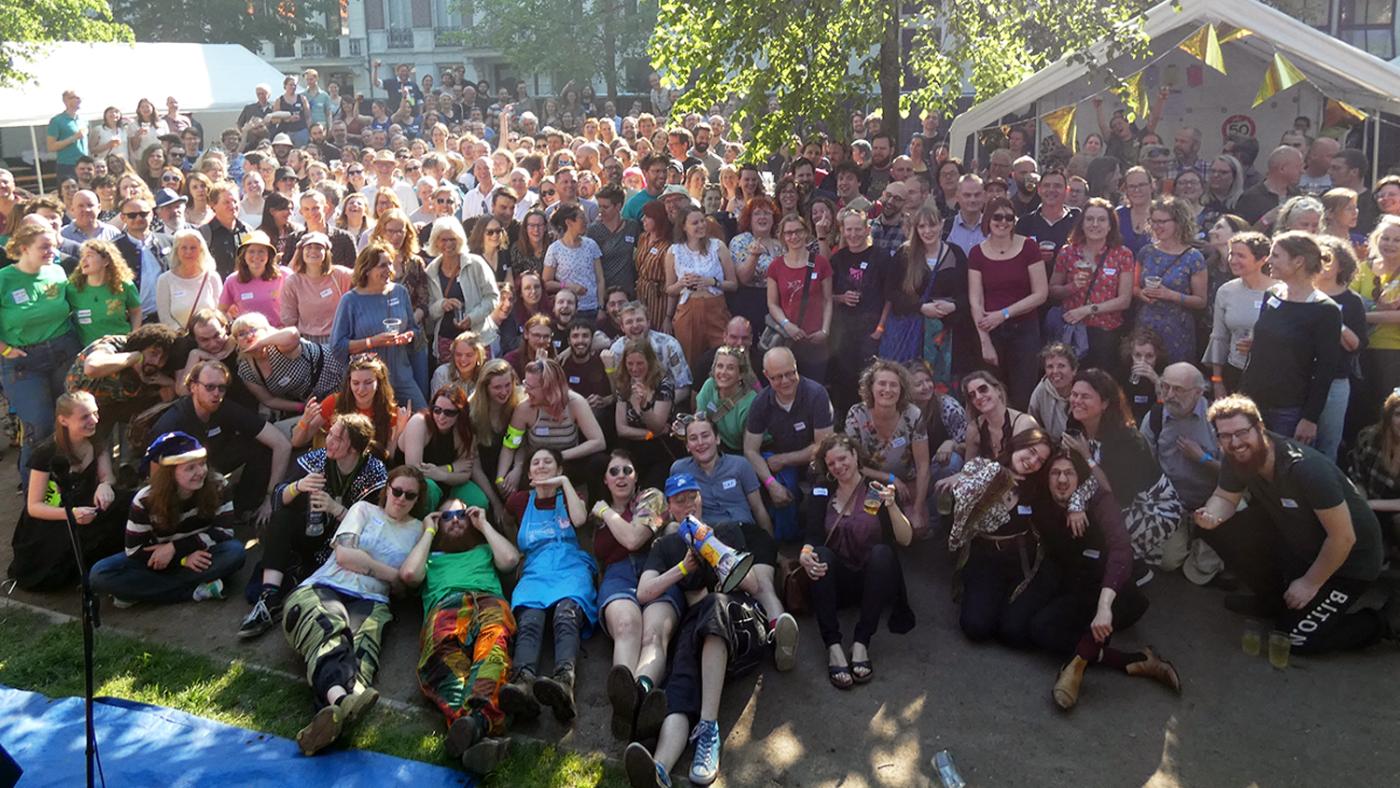
Even though the audience is usually small, Jeroen Droste always rehearses the story he will tell to freshers during the introduction week. After all, the presentation is all about the values that form the pillar of the association he's been connected to for six years. He used to be its director and now serves as an archivist.
The stage at the front of the society stands for non-committal, says Jeroen, with his long hair and full beard. The breadth of the drinks menu corresponds to the diversity of its members. The chickens in the garden and the fish in the cellar are treated as equals to humans, and the size of the association's headquarters, located on Lucasbolwerk Street, is a testament to its small scale. What Jeroen does not mention is that Biton is celebrating its 50th anniversary this year. No need to do that, as the audience already knows it.
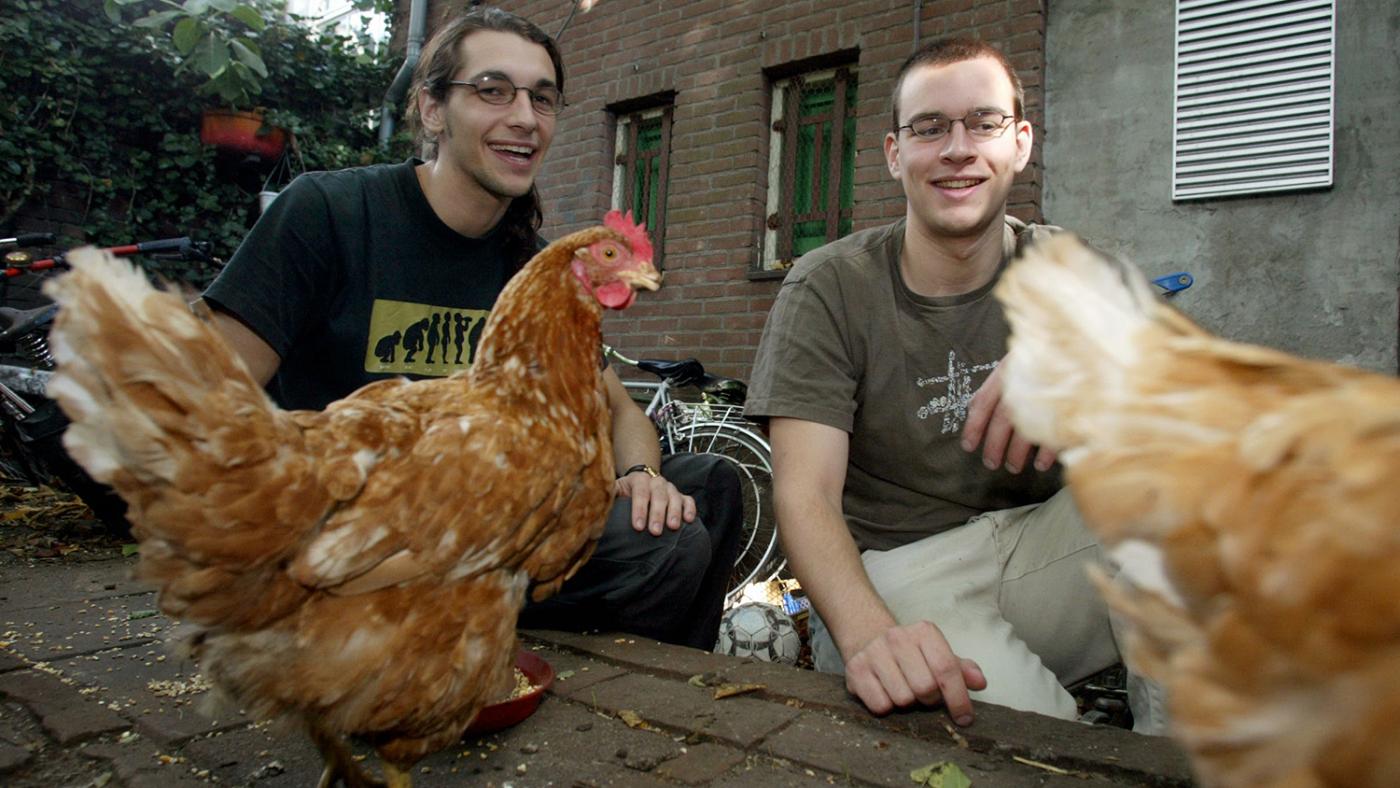
Members of the association beside its chicken. Photo: DUB's archives
Born out of discord
On May 13, Jeroen's birthday, Biton celebrated its 50th anniversary. It is a somewhat misleading date because Biton started out as an independent sub-association within the traditionally reformed SSR-U. However, it was not until February 17 1974, that Biton officially left SSR-U to stand on its own feet.
Biton's formation was the beginning of something new but also the culmination of a struggle that had been going on for over a year at SSR-U. Kerst Troost, who was a member of SSR-U at the time and serves as the fiscal buyer of the corporate board, recollects that he and his friends were caught off guard by the plans made by the general board. "The whole thing derailed when the general board wanted to create a critical, open society youth centre that would also apply for a subsidy from the municipality."
Such plans were in keeping with the times. Influenced by wider democratisation and de-pillarisation, previously closed student associations opened up to non-members, setting up so-called "fun centres". The trend lives on in Utrecht's nightlife: the clubs Ekko, which is the direct successor of SSR-U, and Woolloomooloo originated from it.
But it wasn't just the socially-critical venue that was met with resistance. At the general membership meeting of 1971, the association was opened to non-students and, in 1972, the general board resolved to remove any reference to Christianity from its originally-evangelical foundation. This triggered the emergence of a counter-movement called "the opposition".
Troost says he initially underestimated how many members seemed indifferent to the changes the general board was making. "Apparently there was a whole group within SSR-U that wasn't involved with either of the visions and were rather passive about everything." According to him, it was necessary to get those members involved in the discussion.
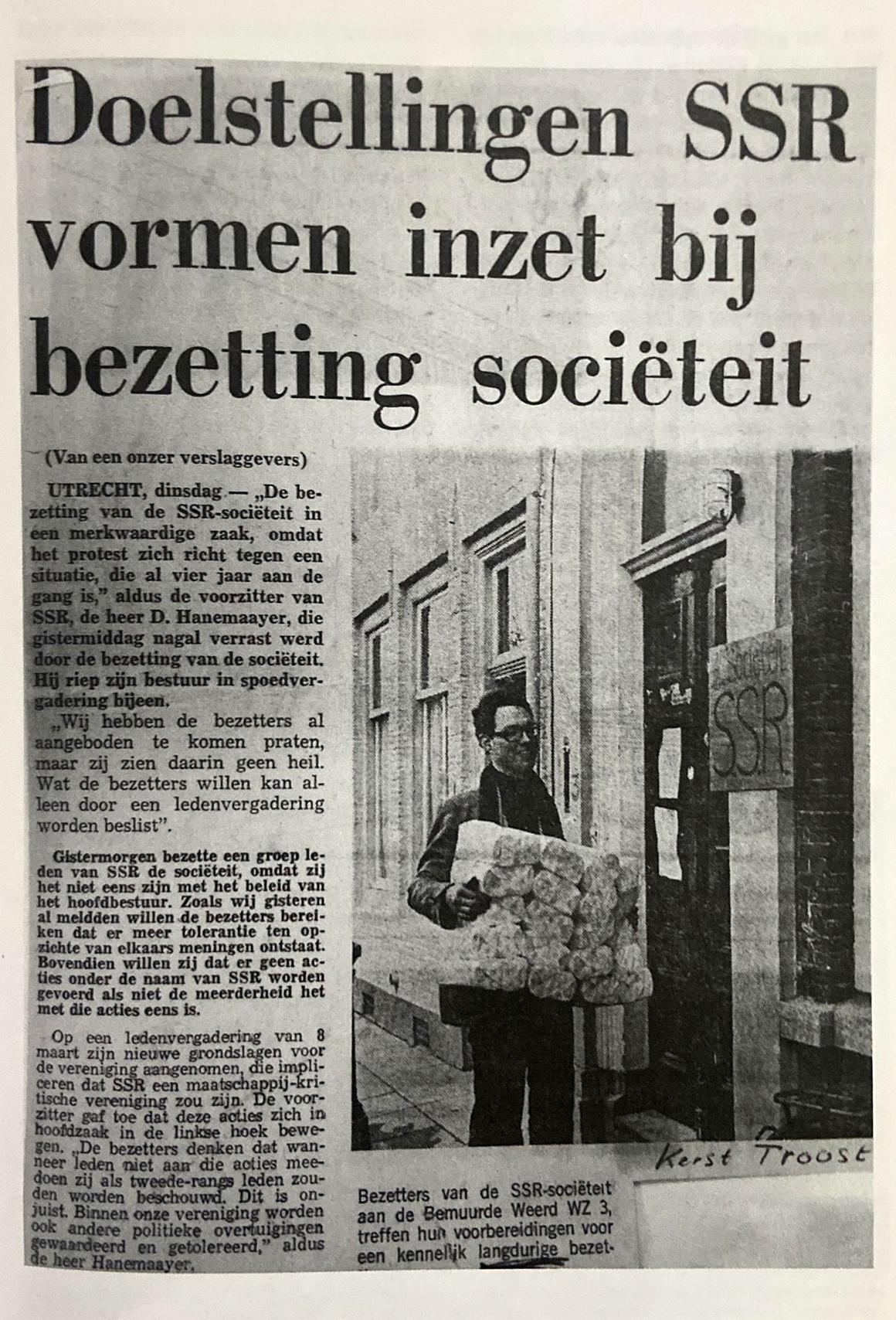
Photo: Biton's archives
The only right-wing occupation in the Netherlands
The way they tried to get those members engaged was later dubbed "the only right-wing occupation in the Netherlands". In April 1972, members of the opposition occupied SSR-U's headquarters. Troost nuances the right-wing image of the occupation: "The intention was not to form a conservative society but rather to form a society in which members could find each other, hold on to each other and help each other grow in what is, after all, a hard time for many."
The occupation partly succeeded but not enough to fundamentally change the course SSR-U was taking. A month later, Biton, which stood for Ben Ik Terecht of Niet ("Am I justified or not", Ed.) was formed as a sub-association. Troost prefers the subsequent name, Basis In Tempore Oppressionis Nata, which translates as "the foundations were created in times of oppression". Troost: "Although Biton was a sub-association within SSR-U, it already had its own statutes and, after a while, it started searching for its own headquarters. Quite soon after that, Biton moved into a cellar."
Evangelical basis
Despite the establishment of an independent sub-association, the conflict was not yet resolved. Lawsuits followed, including one over the legal legitimacy of SSR-U's new statutes, and divisions also arose within Biton itself: "There were two clear currents within Biton. A group that considered the evangelical, reformational basis crucial for club life and a group that was less concerned about that and was willing to accept a more diverse character when it comes to nightlife, albeit still emphasising the importance of mutual tolerance guaranteed by our Christian Dutch culture."
A split followed once again, although this time things were more amiable. One of the groups within Biton gave origin to SSR-NU, an association built on the original foundations of SSR-U. "Biton was torn apart by SSR-NU's departure. About half of the board quit and the rest got quite demotivated." However, Troost argues that there was also a group who be sorry if Biton disappeared.
As a taxman, he decided to become part of Biton's second board, now that it was an independent association. He also suggested his good friend Gerard van der Wal for the role of president. "A golden touch," says Troost. "Gerard managed to position the small group that Biton was at the time — about forty members — as a serious social club and, in August 1974, Biton participated independently in the introduction days." Membership doubled after that.
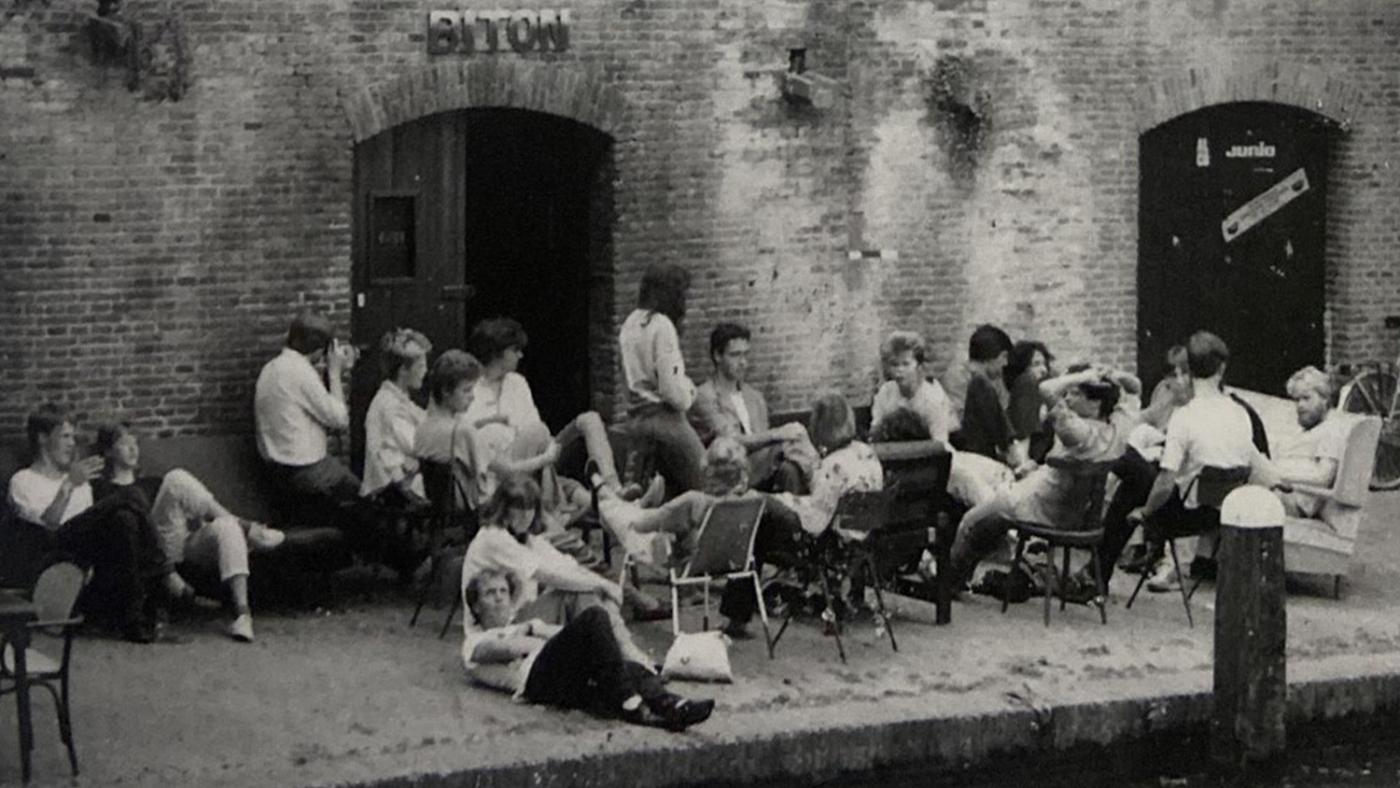
The association back in the day. Photo: Biton's archives
Parallels
The association grew and professionalised rapidly after that, remarks Hans Bodlaender, who was a member of Biton for eight years, some five years after its inception. He also took a seat on the board as a fiscal in 1982. "Everything was organised in a very solid way. The people who set it up in the first couple of years achieved quite something."
Bodlaender got to know the spearheads mentioned by Jeroen when he joined in 1978. "Biton was a small association, we had 150 members. As a result, you get to know all the active members at some point, which makes it very cosy." There was only one disadvantage to that: "There was a lot of gossip as well."
Despite the gossip, the atmosphere is described as convivial and, above all, tolerant. "The things people say about diversity now, I think we were already living it back then. People were different but they just talked to each other." And he doesn't only mean small talk. Sometimes they engaged in deep, philosophical conversations too. "There were hefty discussions about all sorts of things, like faith, politics, how life works. People asked each other: what is your worldview like?"
Jeroen says this vibe still exists. "The occupiers were already writing about togetherness and tolerance regarding different opinions. These are things that can still be found in the association."
So, nothing's changed? Both Jeroen and Bodlaender, two self-proclaimed "pieces of furniture" in the association, think that the essence remains. Jeroen: "The important things haven't changed. The atmosphere is the same. In my view, the things that did change have to do with the times." Bodlaender agrees. Two of his children also joined Biton, so he still catches glimpses of the club from time to time: "When you come there, it's actually quite similar." Although Christianity no longer plays a role in the association, Biton's evangelical foundation is also unchanged to this day.
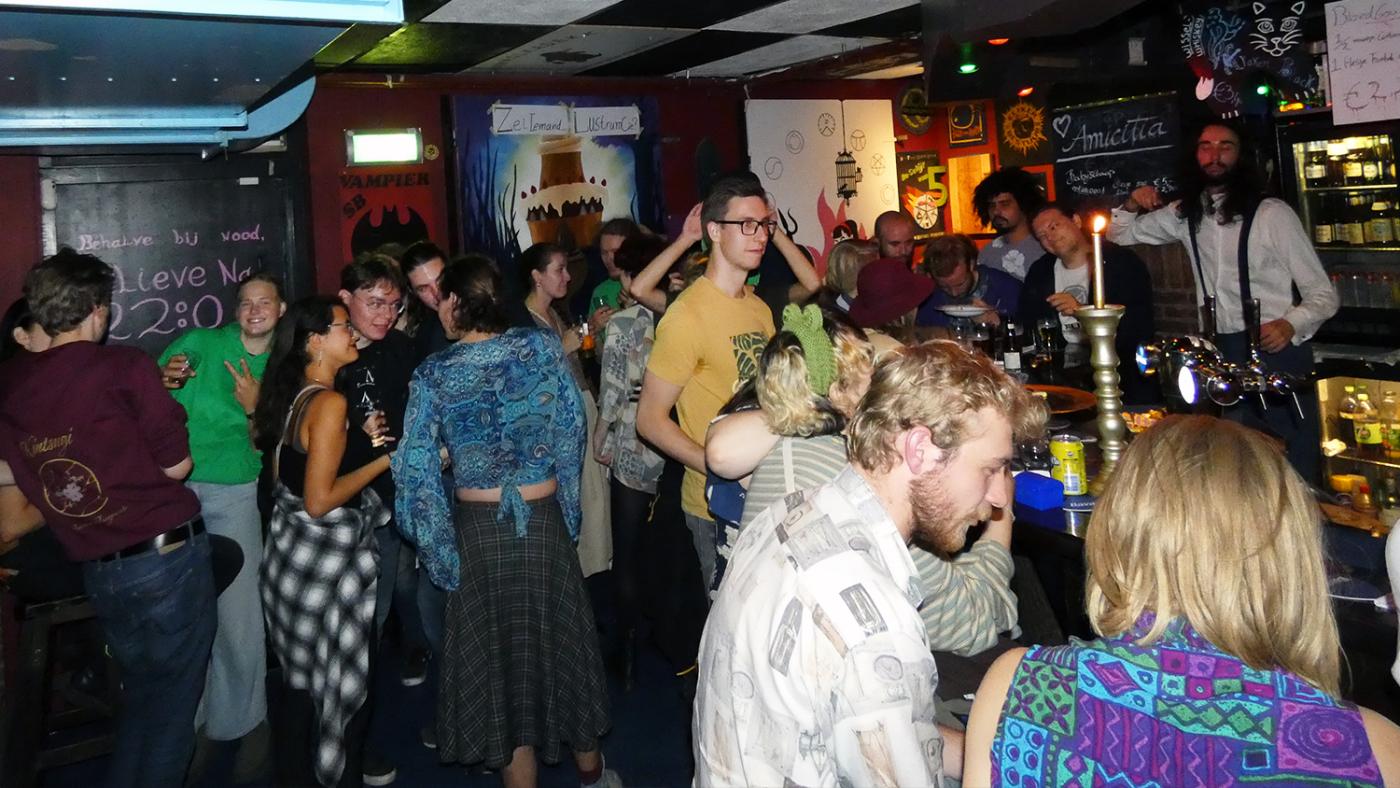
A party at Biton. Photo: courtesy of Biton
A screw loose
After the tour, people take a seat at the bar. Jeroen quotes Jacco Pekelder, UU professor and former Biton member, who's written a memoir that has also been used as a source for this article. Pekelder writes that, every now and then, he stumbles upon Biton members in his lectures: "Thank God, they always have a screw loose."
Jeroen: "That screw loose is something special. For me, that is part of Biton's essence. It's also something I recognise in former members. The togetherness and its consequences: everyone can really be themselves to a large extent, showing their loose screws and the strange things that go with them. That is precisely what makes the association so welcoming."
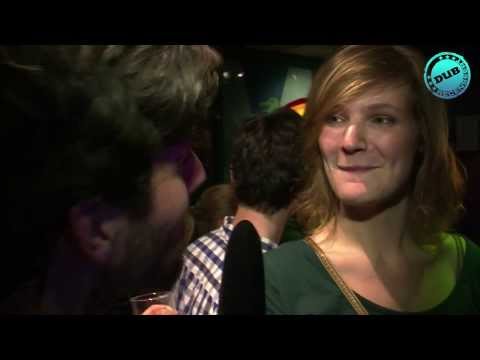
DUB made a video about Biton in 2013 (in Dutch).